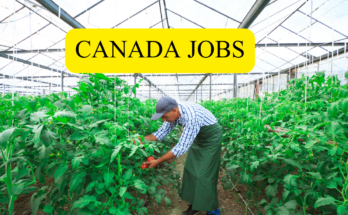Farm working jobs in Canada are a vital part of the country’s agricultural industry. These jobs include tasks such as planting and harvesting crops, caring for livestock, and maintaining farm equipment.
Thank you for reading this post, don't forget to subscribe!Farm workers are responsible for a wide range of tasks, depending on the type of farm they work on. For example, those working on a dairy farm may be responsible for milking cows, while those working on a fruit farm may be responsible for picking and packaging produce. Other tasks may include operating tractors and other heavy machinery, maintaining irrigation systems, and monitoring the health of crops and livestock.

Demand for farm workers in Canada
The demand for farm workers in Canada varies depending on the region and the type of farm. In general, the demand is highest during planting and harvesting seasons. Many farmers rely on temporary foreign workers to help with these tasks, as there is a shortage of Canadian workers willing to do this type of work.
To work as a farm worker in Canada, it is not typically required to have any specific educational qualifications. However, some employers may prefer to hire candidates with experience in agriculture or a related field. Many farm workers learn on the job, and some may receive training from their employer.
Working conditions on farms can be physically demanding, and Farm Working Jobs in Canada may be exposed to a variety of hazards, such as heavy machinery, pesticides, and extreme weather conditions. It is essential that farm workers follow safety guidelines and use protective equipment to reduce the risk of injury.
Read Also: Security Guard Jobs in Canada
Salary for Farm Working Jobs in Canada
Farm Working Jobs in Canada are typically paid on an hourly basis and may be eligible for overtime pay. The average hourly wage for farm workers in Canada is around $15 per hour, although this can vary depending on the region and the type of farm. Many farm workers also receive benefits such as health insurance and paid time off.
In conclusion, farm working jobs in Canada are a vital part of the country’s agricultural industry and offer a wide range of tasks depending on the type of farm. The job is not typically required to have any specific educational qualifications, and many farm workers learn on the job, and some may receive training from their employer. It is a physically demanding job with the risk of hazards, but it pays an average of $15 per hour and benefits such as health insurance and paid time off.
How to Find Farm Worker Jobs in Canada?
There are several ways to find farm worker jobs in Canada:
- Job search websites: Websites such as Indeed, Glassdoor, and LinkedIn have listings for farm worker jobs in Canada. You can search for jobs by location, and filter results by keywords such as “farm worker” or “agriculture.”
- Government job portals: The Government of Canada’s Job Bank website lists job opportunities across the country, including farm worker jobs. The website also includes information on the duties, qualifications, and wages associated with different types of farm worker jobs.
- Recruitment agencies: Some recruitment agencies specialize in placing workers in agriculture and farming jobs. These agencies may have access to job listings that are not available on public job search websites.
- Local farmer’s market or farm stands: Many farmers sell their produce at local farmer’s markets or farm stands. This is a great place to talk to farmers and ask about job opportunities on their farm.
- Networking: Networking is an important way to find jobs, and it’s no different in the agricultural sector. Talk to people you know in the farming industry, attend agricultural fairs and events, and join agricultural organizations to expand your network and learn about job opportunities.
- Local Employment Centers: Many rural communities have employment centers that specialize in finding jobs for people in the farming and agricultural sector.
When looking for farm worker jobs, it is essential to have a clear understanding of the type of work you are looking for and the qualifications required. Be prepared to work hard, be reliable, and have a passion for the farming industry. Also, be prepared to be flexible as some jobs may require to work on different tasks and location.
Skills Required to Get Form Working Jobs in Canada
Here are some skills that are commonly required for farm working jobs in Canada:
- Agricultural knowledge: A basic understanding of farming practices, crop management, and animal care is important for farm workers. This knowledge can be gained through on-the-job training, formal education or hands-on experience.
- Manual labor skills: Many farm jobs require manual labor, such as planting and harvesting crops, lifting heavy bags of feed, and operating heavy machinery. Farm workers should be physically fit and able to perform repetitive tasks for long periods of time.
- Mechanical skills: Some farm jobs require the use of heavy machinery, such as tractors and other agricultural equipment. Farm workers should have knowledge of how to operate and maintain these machines.
- Time management skills: Farm work often requires long hours and may include working on weekends and holidays. Farm workers should be able to manage their time effectively and prioritize their tasks.
- Teamwork skills: Many farm jobs require working in teams, including with other farm workers and supervisors. Farm workers should be able to communicate effectively and work well with others.
- Problem-solving skills: Farm work can be unpredictable, and farm workers may encounter unexpected challenges. They should be able to think on their feet and come up with solutions to problems.
- Safety skills: Farm work can be dangerous, so farm workers should be aware of potential hazards and know how to work safely. They should also have knowledge of first aid and be able to follow safety guidelines.
- Language skills: Some employers may require their farm workers to have a basic level of English or French, as many of the instructions and communication will be in those languages.
- Technical skills: depending on the type of farm, some workers may require specific technical skills, for example, those working on a dairy farm may be required to have experience with milking cows, while those working on a fruit farm may be required to have experience with picking and packaging produce.
It’s important to note that some skills can be learned on the job, but for some jobs, having the specific skills beforehand will make you stand out as a candidate.
Read Also : Hotels in Canada that offer jobs to foreigners
Requirement’s for Form Working Jobs in Canada
The requirements for farm working jobs in Canada vary depending on the specific job and the employer. However, there are some general requirements that are commonly needed:
- Physical fitness: Farm work can be physically demanding, and many jobs require manual labor such as planting and harvesting crops, lifting heavy bags of feed, and operating heavy machinery.
- Experience: Many employers prefer to hire candidates with experience in agriculture or a related field. However, some employers may also consider hiring candidates without experience but with a willingness to learn.
- Legal status: To work in Canada, you must have legal status, such as a valid work permit, permanent residency, or Canadian citizenship.
- Reliability: Farm work often requires long hours and may include working on weekends and holidays. Employers are looking for workers who are reliable, punctual, and able to work flexible hours.
- Safety-conscious: Farm work can be dangerous, so employers are looking for workers who are safety-conscious, follow safety guidelines, and use protective equipment.
- Language: Some employers may require their farm workers to have a basic level of English or French, as many of the instructions and communication will be in those languages.
- Background check: Some employers may conduct background checks on potential employees, to ensure that they have no criminal records that would make them ineligible to work on the farm.
- Transportation: Some farms are located in rural areas, and workers may have to provide their own transportation to and from the farm.
In addition, depending on the type of farm, there are different specific qualifications required. For example, those working on a dairy farm may be required to have experience with milking cows, while those working on a fruit farm may be required to have experience with picking and packaging produce.



